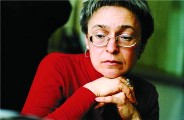 Three men are facing trial for the murder of Russian journalist Anna Politkovskaya, but the investigation is far from over. Index on Censorship reports
Three men are facing trial for the murder of Russian journalist Anna Politkovskaya, but the investigation is far from over. Index on Censorship reports
Friends and campaigners are marking the second anniversary of the journalist Anna Politkovskaya’s death today with a rally in Moscow. Last week, the Investigative Committee of the Russian Prosecutor’s Office announced that it had completed its investigation into her murder. Three men have been charged and are due to go on trial. A preliminary hearing is likely to take place within the next 10 days. However, Politkovskaya’s former colleagues and supporters say that it is too early to talk about completion as the key suspect still remains at large. There are also concerns that the trial, which will be heard in a military court, may be closed to the press and the public.
‘We cannot agree to a statement saying that the investigation of Anna Politkovskaya’s murder is finished. How can it be if the mastermind has not been identified and the supposed killer is on the run?’ declared the newspaper Novaya Gazeta, where Politkovskaya worked.
Politkovskaya primarily wrote about Russia’s military atrocities against Chechen civilians and criticised Chechnya’s pro-Russian president Ramzan Kadyrov. She was gunned down in her apartment building in Moscow in October 2006. The radio station Ekho Moskvy has reported that a CCTV camera recorded Politkovskaya meeting her killer face to face. Although the footage also shows the gunman and a woman following Politkovskaya on her way to a supermarket, there were no women among the initial suspects.
The three men charged with Politkovskaya’s murder are Sergei Khadzhikurbanov, a former officer in the combating crime unit of the Moscow City Police Department, and Ibragim and Jabrail Makhmudov, who are brothers of Chechen origin. A fourth suspect, Russian security service officer, Pavel Ryaguzov, has been charged with abuse of office and extortion. According to Alexei Sokolov, deputy editor of Novaya Gazeta, the Prosecutor’s Office is continuing its investigation of another suspect, Rustam Makhmudov, who is said to be at large. An international warrant has been issued for his arrest.
The chief investigator, Petros Garibyan, told Novaya Gazeta that Khadzhikurbanov is considered the brains behind the murder. However there have been reports in the media that the investigation is also focusing on the Chechen rebel leader Khozh Akhmed Nukhayev, who has been officially named as responsible for the murder of the journalist Paul Klebnikov in 2004.
Media campaigners also fear that the trial will fail to reveal the real instigator of the crime, as the judiciary is not independent in Russia. In an interview with Ekho Moskvy last week, Dmitry Muratov, editor of Novaya Gazeta, expressed concerns that leaks from the investigation had meant that suspects had managed to avoid prosecution.
According to the International Federation of Journalists, Russia is now the second most dangerous country in the world for journalists, after Iraq. The Russian Union of Journalists has recorded the names of 211 journalists killed in Russia since 1991. ‘In many cases those masterminding such crimes are never found accountable before a Russian court,’ says IFJ president Jim Boumelha.




